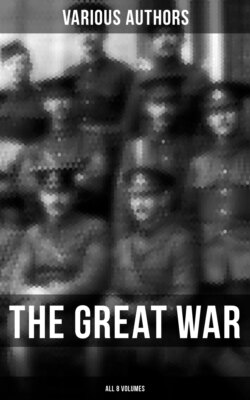Читать книгу The Great War (All 8 Volumes) - Various Authors - Страница 23
На сайте Литреса книга снята с продажи.
ITALY
ОглавлениеFor the purposes of a summary it is unnecessary to review in detail the Italian operations. They have no distinctive challenge to the reader. Italian statesmanship imposed upon the Italian high command a task which made immediate victory impossible, and assigned to Italy the useful but inglorious rôle of occupying some 400,000 Austrian troops, and thus contributing to the strain imposed upon the Central Powers and to the hastening of the moment when exhaustion might be expected to set in.
Had Italy decided to enter the war at the moment when Russia was destroying Austrian armies in Galicia in September and October of 1914 she would almost unquestionably have supplied the necessary numbers to bring a speedy and decisive defeat for the Central Powers. Again, had she selected the moment when Russian armies were at the crests of the Carpathians, and Przemysl had just fallen, she would have probably made the German offense against Russia impossible, brought Rumania in with her, and produced the collapse of Austria. Bulgaria would not have enlisted with the Central Powers, Greece would almost certainly have attacked Turkey, and the Balkan campaign would not have taken place.
But German diplomacy averted the second peril, and Italian alignment with Austria and with Germany in the Triple Alliance made an attack at the opening of the war unthinkable. When Italy did come in, the German victory in Galicia had been won, Russia was in retreat, the allied defeat before the Dardanelles forts and the Russian disasters had produced a profound effect in Balkan capitals, and Austria was able to find the troops to meet and check the Italian advance almost at the frontier. Since that time the Italian operations have been merely trench conflicts, and Italy has nowhere penetrated a score of miles into Austrian territory, nor has she taken Trieste, Trent, or even Gorizia.
If one desires a parallel for the Italian operations it is to be found in the later phases of the Peninsula War against Napoleon. This field was never of decisive importance, but it did require the attention of several of Napoleon's best marshals, and drew off thousands of French soldiers needed by the great emperor in the campaigns in eastern Germany, where his fortunes were finally decided. What Wellington did, the Italians under Cadorna have been imitating in their own peninsula, and their service to their allies has thus been very considerable.
Nor is it necessary for the purposes of so rapid a review of the main phases of the war to dwell upon the allied failure in the west between the end of the battles of Flanders in November, 1914, and February, 1916. At the beginning of 1915 what were allied hopes and purposes in the west? Unquestionably French and British public believed that with the coming year the Grand Alliance would be able to crush Germany. Unquestionably French and British high commands planned to open the summer with a drive that would clear France and Belgium. As for the Germans, having laid their plans to go to Russia, they asked nothing of their western armies save that the lines should be held.
The French began their spring drive in Artois and in Champagne. The Artois fighting of May and June was exceedingly severe, incidental gains were made, but the British were suddenly disclosed lacking in all proper ammunition, lacking in numbers to support the French offensive, and barely able to hold their own lines about Ypres, after desperate fighting, made memorable by the first use by the Germans of gas as a weapon of offense.
From June until September the western armies stood still, while Britain organized her munition manufactures and continued to send her new troops to the Continent. Kitchener's "million" was not realized until the late fall, instead of the early spring. But when, in the latter days of September, the British attacked about La Bassée, and the French in Champagne, the muddling of British officers cost the Allies a considerable triumph in Artois, and the French victory in Champagne was purely local. Some 30,000 prisoners, 200 cannon, this was the fruit of an offensive which cost the British 60,000 casualties, and the French hardly less than twice as many.
German defense, therefore, fulfilled its mission in the west, German armies were able to drive deep into Russia without having to detach reenforcements to the west. Such offensives as the Allies ventured were either complete failures or merely local successes, without major value. Belgium and northern France were not liberated, and there was, as yet, not even a promise of the crushing of Germany.
